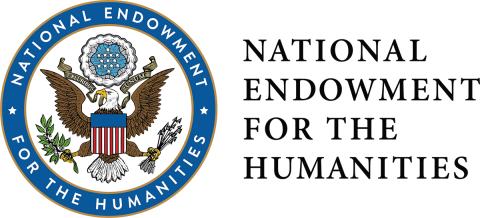Active Grant-Funded Projects at the UNH Center for the Humanities
SUMMER INSTITUTES IN PUBLIC HUMANITIES
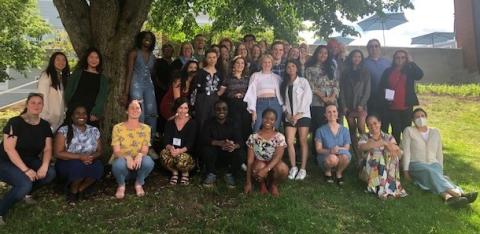
Funded by a major grant from the Mellon Foundation, the week-long institutes in public humanities convened in the summers of 2019, 2021 (virtually), and 2022. Summer institutes were designed to ground humanities faculty, graduate students, and undergraduate students in the intellectual rationale, history, foundational skills, and prospects for doing engaged work in the humanities. The New England Humanities Consortium co-sponsored the programs. Visiting scholars and practitioners who have deep engagement in public humanities served as instructors and presenters. The program encompassed thoughtful considerations of what we mean by “the public good" and how to communicate and collaborate beyond the academy. All faculty and graduate student participants were eligible for seed funding to start or sustain public humanities projects after the Institute.

HOMELANDS: AN AUGMENTED REALITY APP
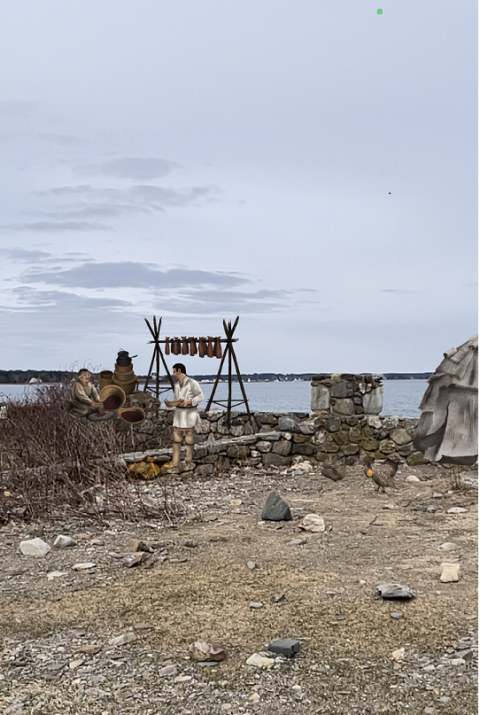
The National Trust for Historic Preservation awarded the Center a grant from its Telling the Full History Preservation Fund, to create “Homelands: An Augmented Reality App Interpreting Indigenous Heritage in New Hampshire.” The project was undertaken in collaboration with the Indigenous New Hampshire Collaborative Collective (INHCC) and Film Unbound . The Homelands project consists of visual portrayals of indigenous lifeways (such as wigwams, fishing, foraging, hunting, etc.) that populate the landscape when viewed through the Homelands App on a mobile device at any of three sites (Strawbery Banke Museum, Odiorne Point, and Star Island) with interpretive educational text informed by INHCC’s Storymap. SvetLana Peshkova (Dept of Anthropology) served as principal investigator on the Homelands project.

BIPOC MONUMENTALITY IN NEW HAMPSHIRE
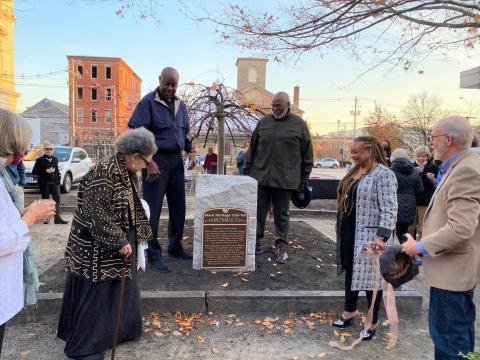
JERRIANNE BOGGIS, EXECUTIVE DIRECTOR OF THE BLACK HERITAGE TRAIL OF NEW HAMPSHIRE (MIDDLE RIGHT), AT THE UNVEILING OF THE POMP AND CANDACE SPRING MARKER IN PORTSMOUTH IN NOVEMBER 2021. (COURTESY of BHTNH)
The American Council of Learned Societies (ACLS) awarded the Center a Sustaining Public Engagement Grant in 2022 to support a focus on “BIPOC Monumentality in New Hampshire” in collaboration with the Black Heritage Trail of New Hampshire (BHTNH) and the INHCC. The aim of “BIPOC Monumentality in New Hampshire” was to revitalize projects that center on a variety of monuments and related activities in the state of New Hampshire devoted to the history and cultural presence of underrepresented communities and include markers, story maps, land connections, and conversations. Then Center-director Stephen Trzaskoma served as principal investigator and SvetLana Peshkova as co-principal investigator.

FROM THE FRAGMENTS: PLACES AND PEOPLE IN COLONIZED NEW ENGLAND
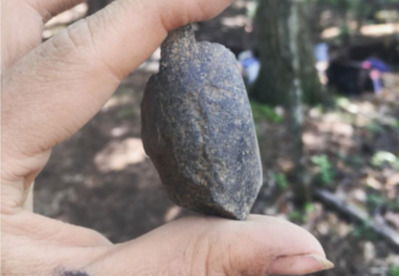
photo courtesy of From the Fragments: https://arcg.is/1jCe9m
The National Endowment for the Humanities awarded the Center a Landmarks of American History and Culture grant, which supports residential, virtual, and combined format projects that situate the study of topics and themes in K–12 humanities within sites, areas, or regions of historic and cultural significance. In July 2023, we hosted K–12 educators for a series of place-based encounters with global colonialism. Our primary site was what is known as the Great Bay Estuary, a distinctive ecosystem that formed an important English colonial frontier in the 17th century and has been occupied for millennia by Abenaki/Penacook peoples. Each of the first four days considered, in depth, the experiences of a different population, placing the experiences of Native Americans and African Americans alongside narratives of what would eventually become the white majority, with a final day for curriculum building. The overarching goal was to study cultural heritage materials in combination with physical sites and document those experiences online so that we share with students a more equitable and inclusive early American story. The basis for this Landmark program was the Great Bay Archaeological Survey (GBAS), directed by UNH Professor of Anthropology and Carnegie Fellow (and now Director of the Center for the Humanities) Meghan Howey since 2016. A community-engaged, interdisciplinary research program, GBAS has found and excavated 17th- and early 18th-century colonial era occupation sites, both English and Indigenous, across the estuary. GBAS has accumulated years of materials and resources, including, most notably and powerfully, From the Fragments (https://bit.ly/greatbayarchaeology), an interactive website that documents how GBAS unearthed dynamic and often excluded colonial experiences and lives in this landscape.
